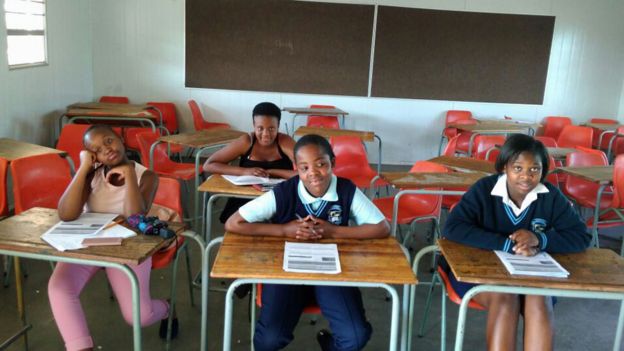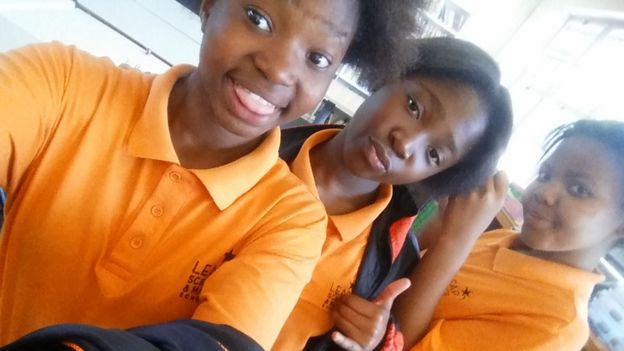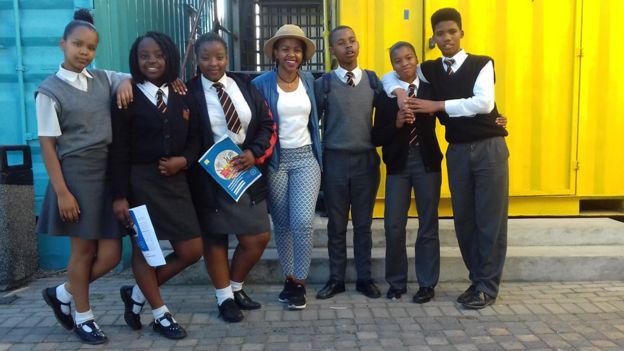This article is more than
6 year oldUK student ambition exported to South Africa's townships
The Brilliant Club is an award-winning scheme that puts PhD students into schools in the UK, with the aim of teaching new skills, raising aspirations and making university seem a more attainable goal.
In South Africa, operating as AccessEd, it has completed a pilot year in 16 schools and two youth centres, with pupils aged about 13 to 15.
In the UK, the big divide in access to university is social background. Young people from wealthy families are much more likely to go to university than poorer youngsters.
University gap
This is also the case in South Africa - but with the big overlaying factor of race casting a post-apartheid shadow.

The university access rate for white teenagers is over 40%, for their black counterparts it is below 10%.
Programme director Rajbir Hazelwood says that as well as academic challenges, there are some big practical difficulties to overcome.
In townships such as Philippi in Cape Town and Alexandra in Johannesburg, the problems can be about the lack of basic infrastructure and "classrooms fit for purpose".
In Philippi, she says: "The majority of our pupils had no access to ICT [information and communications technology].
"With basic needs not met, these under-resourced schools face an upward struggle in supporting their pupils in the matriculation exams which allow you to go to university in South Africa."
Ms Hazelwood adds that university dropout rates are very high in South Africa, as much as 40%.

While the focus of the project in the UK is giving young people the confidence to apply, in South Africa they have to give their students the "academic and social skills" needed to complete their degrees.
But in both the UK and in South Africa, a key part of this project has been to give disadvantaged youngsters a sense of intellectual challenge, inspiring them to think beyond their immediate horizons.
The postgraduate students working with the project run tutorials and teach university-style courses, with assignments and marking.
In South Africa, for those who successfully finish the programme, the graduation event is to go to a university and see, perhaps for the first time, what it's like to be a student and to show that it's an accessible target.
Unequal chances
It's a chance for the university too to talk to young people about how they might take the next steps and what they will need to get on to a degree course.

University access in South Africa is also highly political, with protests that poor, black youngsters are still not getting their fair chances, either through cost or inadequacies in their school-level education.
Last month, responding to such dissatisfaction, the president, Jacob Zuma, promised free higher education for poorer students, with grants covering fees to be phased in from this year.
But this has raised questions about whether the university system has the capacity for many more students and how this will be delivered.
Although continents apart, the projects in the UK and South Africa both reflect the significance of getting young people into university.
"Graduates have better employment prospects and earning power, better health and wellbeing and better civic engagement," says the impact report on AccessEd's pilot phase.
But access to becoming a graduate remains deeply unequal.
More from Global education
- Liberia's big school experiment
- Sesame Street to help teach Syrian refugees
- Helping to keep girls in school in India
- Next Pisa tests will rank countries on tolerance
- Egyptian mummy's secrets revealed in hi-tech lab
- The nursery in Amsterdam's red light district
- From $50 in his pocket to a $500,000 education prize
- Terror survivor campaigns for open speech
Ideas for the Global education series? Get in touch with sean.coughlan@bbc.co.uk
Keywords
Newer articles
<p>After sparking fears among fans by posting a series of crying photos, Justin Bieber has taken to social media with a huge announcement.</p>
Kendrick Lamar Beat Drake By Being Drake
UN assembly urges Palestine membership after vote
How Kendrick Lamar and Drake changed rap beefs forever Rapid-fire releases and fast pace of modern life elevate diss war to levels unparalleled in hip-hop history.
Taylor Swift concert photo horrifies internet
Sean 'Diddy' Combs asks judge to reject lawsuit alleging rape of 17-year-old girl in 2003
Ukraine finds itself in a grave situation. Russia appears to be advancing
Ellen to make TV comeback after two years
Island nation erupts into violence, three dead
Will Zionism survive the war?
